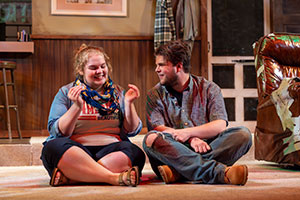UM-Flint Theatre's production of 'Exit, Pursued by a Bear' explores trauma and liberation through a darkly humorous lens

The adage, "hurt people hurt people," is brought humorously to life in the University of Michigan-Flint's inaugural theatre production of the 2024-25 season, "Exit, Pursued by a Bear." Billed as a smart, dark revenge comedy, Lauren Gunderson's play explores broad themes like love and loss through the lens of contemporary socialization, the perceived differences between the sexes, and the cyclical nature of trauma.
Set in a musty, threadbare home in northern Georgia, the performance begins with excerpts of Jimmy Carter's 1979 speech "Crisis of Confidence." The stage is dimly lit, highlighting the former president's impassioned message playing on a large television, and our heroine, Nan—played by Bethann Sampson, a junior theatre major from Grand Blanc—is pacing nervously around the stage. A beat-up leather recliner is positioned facing away from the audience, and we see a slumped head leaning forward. As a complement to Carter's televised message, there is a poster of him and Walter Mondale on the kitchen wall, and Nan dons a t-shirt emblazoned with "America the Beautiful" across the front.
After a few dramatic spotlights on our main characters, accompanied by contextual framing and stage direction that has replaced Carter on the television screen, we are treated to a brief recap of the most recent events that have led to Nan duct-taping her husband, Kyle—played by Logan Keir, a senior English/pre-law major with a minor in criminal justice from South Lyon— to the recliner. We almost immediately meet one of Nan's partners-in-crime, Sweetheart—played by Claire Milton, a first-year theatre major with a minor in psychology from Owosso—an aspiring actress drafted to reenact the part of Kyle in Nan's journey of catharsis. Shortly after that, Simon arrives—played by Logan Reeves, a senior theatre major from Fenton—Nan's best friend, giving moral support, bolstering Nan's courage and offering the sometimes brutal advice that can only come from a friend who has known you almost as long as you've known yourself.


The trio engages in a series of overdramatic reenactments to show Kyle the errors of his ways and to explain why Nan is leaving him. Kyle lobbies to make his case, asking to reenact the early days of the pair's romance to show Nan that things weren't always bad. Throughout the play, we are reminded of the final, extreme act of revenge that Nan, Sweetheart and Simon have planned: Laying out raw meat and honey, leaving the doors open and Kyle vulnerable and exposed to hungry bears.
Sampson, Milton, Reeves and Keir deliver unselfconscious performances that bring the reenactments to life and offer context to each character's deep, somewhat codependent ties. They are at once joyful and angry, sad and aspirational—taking the audience on the roller coaster of emotions that have inspired them to concoct this act of extreme revenge. Sampson's Nan and Keir's Kyle are deliciously complex and remind us that, given the proper context, either of them can be viewed as the victim or the hero.
Initially painted as the villain, we come to feel a bit of pity for Kyle as he wrestles with his confusion about what it means to be a man and a husband and the impact that his socialization and trauma have had on his sense of self. There is perhaps more depth in exploring Kyle's experiences of cyclical trauma than Nan's. Still, we see how easily she is wooed by Kyle's rather pedestrian attempts at romance—leading us to the assumption that she, too, is also desperate for love and belonging in a somewhat dysfunctional manner.
Milton's Sweetheart is exuberantly supportive, while Reeves' Simon brings comic relief accented by serious amounts of shade. Both serve as conduits to Nan's internal struggles with self-love, sometimes serving as devilish counterparts to Nan's attempts to listen to her higher angel—often personified as Carter. But through it all, we are party to a kind of intervention: Two people stepping in, desperately trying to remind someone they love why they should make better choices for themselves.
The play is perhaps best summed up in Nan's proclamation that "revenge is a core American value. I just don't want to hurt anybody." This type of cognitive dissonance has led us to this moment of overwrought drama and exaggerated vengeance, and it serves as a potent reminder of how muddied intimate relationships can become—especially when those involved in them lack the emotional intelligence necessary to truly see the other.
Overall, "Exit, Pursued by a Bear" brings humor and wit to complex topics and is particularly timely in exploring how we might connect through seemingly vast differences—while also honoring each other's humanity and our need for liberation.
"Exit, Pursued by a Bear" runs through Nov. 17 at the UM-Flint Theatre. Advance tickets are available online, with some available at the box office on performance days.
Related Posts
No related photos.
Kat Oak
Kat Oak is the communications specialist for the College of Arts, Sciences, and Education. She can be reached via email at [email protected].